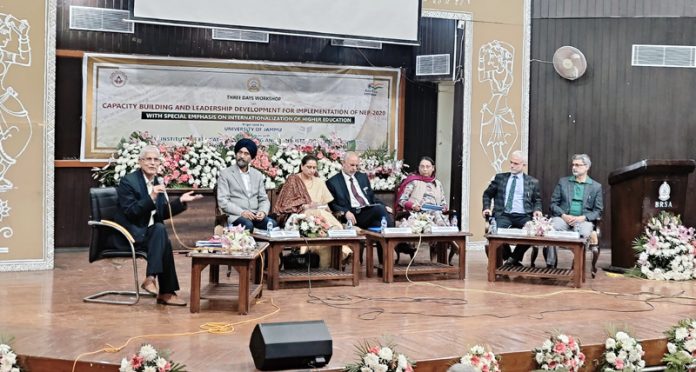
Excelsior Correspondent
JAMMU, Mar 13: With an aim for internationalization of higher education, a three days workshop for enhancing capacity building and leadership skills for the effective implementation of the National Education Policy 2020 (NEP – 2020) was held here today.
The workshop was organised at University of Jammu in collaboration with the National Institute of Educational Planning and Administration (NIEPA).
Speaking on the occasion, the Lieutenant Governor, Manoj Sinha, commended the initiative as a significant step towards reforming the educational landscape of Jammu and Kashmir.
In his keynote address, he emphasized on the importance of aligning educational institutions with the vision of Prime Minister Narendra Modi to lead the nation’s educational reforms.
LG Sinha outlined five key aims and vision to establish a robust foundation for future-oriented education, stressing the need for creativity, innovation, and mentorship in classrooms and urged educational institutions to become hubs of skill development and innovation, fostering an environment conducive to creativity and intellectual growth.
Prof. Umesh Rai, shared valuable insights during the inaugural session and outlined the program’s dynamic nature and its focus on holistic development.
In his address , he reiterated the significance of the “Design Your Degree” program and emphasized its alignment with the NEP – 2020 objectives and its potential to foster critical thinking and digital literacy among students.
Distinguished panellists highlighted the importance of critical thinking, multidisciplinary learning, and innovative teaching methodologies in nurturing students’ intellectual growth.
Dr. Amitash Ojha, IIT Jammu: Presented cognitive learning and psychological perspectives, emphasizing the organic nature of learning and the need to address the rigidity of the education structure.
Prof. Anju Bhasin, from the University of Jammu, emphasized the need for flexible, self-learning curriculum to enhance critical thinking and collaborative research among youngsters. Prof. A.H. Moon advocated for designing degree programs that incorporate practical knowledge over theoretical learning, emphasizing the importance of feedback and evaluation.
Prof. Neelu Rohmetra, Dean of Research Studies at Jammu University, discussed the necessity of flexibility in curriculum to adapt and adopt, citing examples from premier institutions globally.
Dr. Balbeer Singh of SMVDU addressed four challenges: multidisciplinary approach, mandatory courses, objective evaluation systems, and preparing students to become job providers rather than seekers by closely associating faculty with industries for internship opportunities.
Addressing the theme of leveraging digital technologies in higher education, speakers emphasized the need to adapt to technological advancements and incorporate online learning platforms for enhanced pedagogical practices.
The panellists included Professor Sham Lal Narayan, Dr Sayantan Mandal, Prof. Rityusha Tiwari, Prof. Farooq Ahmed Masoodi, Dr. Sayantan Mandal, Prof. Sudhanshu Bhushan, Naveen Anand, Prof. Ayaz Hassan Moon, Prof. Vijay Lakshmi Brara. They collectively stressed the importance of addressing challenges in curriculum structure through flexibility, practical learning, and industry collaboration.
The session provided valuable insights into harnessing digital technologies in higher education, emphasizing the need for adaptation and integration of innovative pedagogies.

